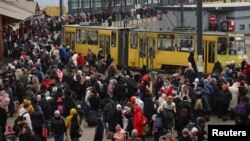WASHINGTON — Civilians in some parts of Ukraine besieged by Russian forces were able to evacuate Tuesday, fleeing in buses or on foot amid temporary cease-fires.
One evacuation saw people leaving the eastern city of Sumy, where hours earlier a Russian airstrike on a residential street killed at least 21 civilians, according to local authorities.
People were also seen leaving the town of Irpin, near the Ukrainian capital of Kyiv.
Russia’s defense ministry said additional evacuation corridors would be in place in Chernihiv, Kharkiv and Mariupol.
Several previous attempts to set up a way for people to get out of areas that have been subjected to Russian attacks during the nearly two-week-old Russian invasion of Ukraine fell apart, including one for those in Mariupol.
Ukrainian Foreign Minister Dmytro Kuleba on Tuesday accused Russia of holding 300,000 people “hostage in Mariupol” and preventing humanitarian evacuations.
“I urge all states to publicly demand: RUSSIA, LET PEOPLE GO!” Kuleba tweeted.
NATO Secretary-General Jens Stoltenberg called the civilian impact in Ukraine “devastating” and called for “real humanitarian corridors that are fully respected.”
“There are very credible reports of civilians coming under fire as they try to evacuate,” he said. “Targeting civilians is a war crime and it’s totally unacceptable.”
The U.N. refugee agency said Tuesday more than 2 million people have fled Ukraine since Russia launched its invasion on February 24. More than half have gone to Poland.
U.N. High Commissioner for Refugees Filippo Grandi said there has not been such an exodus in Europe since World War II.
U.S. Secretary of State Antony Blinken called on Russia to allow humanitarian access for civilians in Ukraine, and said Ukraine's allies will do "everything we can" to ensure Ukrainians have what they need to defend themselves.
"This is President Putin's war to subjugate a sovereign, democratic country. And until he ends it, the world will hold him accountable," he said during a joint news conference with Estonian Prime Minister Kaja Kallas in Tallin.
Kallas said the conflict demands “our continued and united support for Ukraine,” including military and humanitarian support, and closing loopholes in sanctions against Russia.
“We will keep finding new tools in our toolbox until Putin’s war machine has been neutralized,” she said.
Amid discussion of the possibility of imposing a ban on Russian oil, Blinken said there is ongoing work to ensure a steady global supply of energy from other sources.
"There is a significant, not only opportunity, but imperative in this moment to finally move off a dependence on Russian energy because Russia uses it as a weapon," he said.
Blinken is heading to Paris for talks Tuesday with French President Emmanuel Macron, who has spoken in recent days with both Putin and Zelenskyy.
The White House said President Joe Biden held a video call Monday with the leaders of France, Germany and Britain to discuss the situation in Ukraine.
“The leaders affirmed their determination to continue raising the costs on Russia for its unprovoked and unjustified invasion of Ukraine,” according to the White House.
White House press secretary Jen Psaki said the leaders discussed the possibility of imposing a ban on importing oil from Russia. She said Biden has not yet decided whether to take such an action.
“No decision has been made at this point,” she told reporters, while adding that European countries have “different capacities and capabilities.”
Russian attacks overnight included bombings of cities in eastern and southern Ukraine and shelling that hit several suburbs of Kyiv.
Britain’s defense ministry said Ukrainian forces are resisting Russia’s advance toward Kyiv with pressure in towns outside the capital city.
British Defense Secretary Ben Wallace said Tuesday such resistance and supply problems are making Russian forces more desperate. He said as a result, Russia is conducting “indiscriminate shelling” of civilians.
Kuleba and Russian Foreign Minister Sergey Lavrov are due to meet Thursday in Turkey to discuss the situation. Kuleba said he will propose a direct meeting between Ukrainian President Volodymyr Zelenskyy and Russian President Vladimir Putin.
“We want talks between the president of Ukraine and Vladimir Putin since he is the one who makes the final decisions,” Kuleba said on Ukrainian television.
A series of lower-level talks between the two sides yielded no major breakthroughs in resolving the conflict.
VOA chief national correspondent Steve Herman, national security correspondent Jeff Seldin, Pentagon correspondent Carla Babb, Istanbul foreign correspondent Heather Murdock, White House correspondent Anita Powell, and senior diplomatic correspondent Cindy Saine contributed to this report. Some information also came from The Associated Press, Agence France-Presse, and Reuters.




